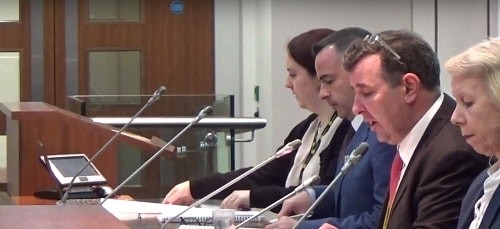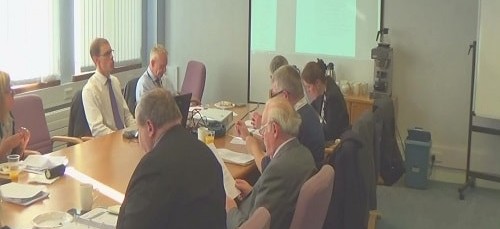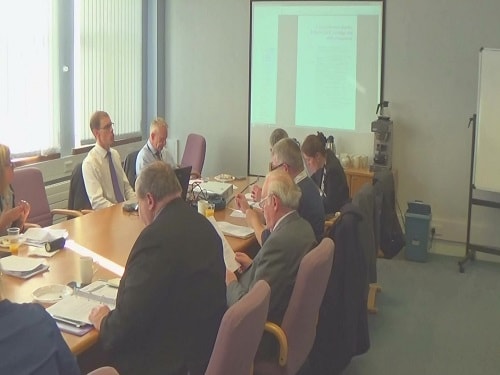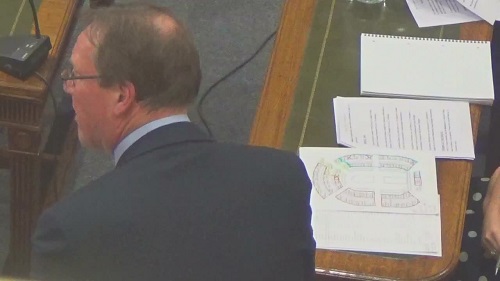Why did I blow the whistle to Merseytravel?
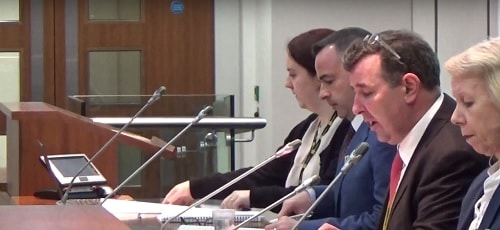
Below is an email I’ve just written about what happened today. I look forward to reading your comments on it. If I had faith in the whistleblowing procedures at Merseytravel I would not see the need to publish it, however these remarks do not inspire me with confidence. I realise I tend to get a bit verbose
I wonder what the response will be?
CC:
“Louise Outram (Monitoring Officer, Merseytravel)” <louise.outram@merseytravel.gov.uk>,
“Stephanie Donaldson (Head of Internal Audit, Merseytravel)” <stephanie.donaldson@merseytravel.gov.uk>,
“Liz Carridge (Press Office, Merseytravel)” <liz.carridge@merseytravel.gov.uk>,
“Angela Sanderson (Monitoring Officer, Liverpool City Region Combined Authority)” <angelasanderson@sthelens.gov.uk>,
“Cllr Anthony Carr (Chair, LCRCA Audit Committee)” <anthony.carr@merseytravel.gov.uk>,
“Cllr Pam Thomas (LCRCA Audit Committee)” <pamela.thomas@liverpool.gov.uk>,
“Cllr Nina Killen (LCRCA Audit Committee/Scrutiny Panel)” <nina.killen@councillors.sefton.gov.uk>,
“Cllr Andy Moorhead (LCRCA Audit Committee/LCRCA)” <andy.moorhead@knowsley.gov.uk>,
“Cllr Rob Polhill (LCRCA Audit Committee/LCRCA)” <rob.polhill@halton.gov.uk>,
“Cllr Mike Sullivan (LCRCA Audit Committee/Scrutiny Panel)” <mikesullivan@wirral.gov.uk>,
“Cllr Kevin Wainwright (LCRCA Scrutiny Panel)” <kevan.wainwright@halton.gov.uk>,
“Cllr David Baines (LCRCA Scrutiny Panel)” St Helens c/o <cllraburns@sthelens.gov.uk>,
“Cllr Lawrence Brown (LCRCA Scrutiny Panel)” <Lawrence.Brown@liverpool.gov.uk>,
“Cllr Anthony Burns (LCRCA Scrutiny Panel)” <cllraburns@sthelens.gov.uk>,
“Cllr Eddie Connor (LCRCA Scrutiny Panel)” <eddie.connor@knowsley.gov.uk>,
“Cllr Patrick Hurley (LCRCA Scrutiny Panel)” <patrick.hurley@liverpool.gov.uk>,
“Cllr Allan Jones (LCRCA Scrutiny Panel)” <cllrajones@sthelens.gov.uk>,
“Cllr Anita Leech (LCRCA Scrutiny Panel)” <anitaleech@wirral.gov.uk>,
“Cllr Sue McGuire (LCRCA Scrutiny Panel)” <sue.mcguire@councillors.sefton.gov.uk>,
“Cllr Michael O’Brien (LCRCA Scrutiny Panel)” <michael.o’brien@councillors.sefton.gov.uk>,
“Cllr Marie Stuart (LCRCA Scrutiny Panel)” <marie.stuart@knowsley.gov.uk>,
“Cllr Bill Woolfall (LCRCA Scrutiny Panel)” <Bill.Woolfall2@halton.gov.uk>,
“Frank Rogers (Interim Chief Executive/Interim Head of Paid Service, Merseytravel)” <frank.rogers@merseytravel.gov.uk>,
“Mayor Joe Anderson OBE” <mayor@liverpool.gov.uk>,
“Councillor Phil Davies” <phildavies@wirral.gov.uk>,
“Councillor Barrie Grunewald” <CllrBGrunewald-Leader@sthelens.gov.uk>,
“Robert Hough CBE” <info@liverpoollep.org>,
“Councillor Ian Maher” <ian.maher@councillors.sefton.gov.uk>,
“Ian Warwick (KPMG)” <ian.warwick@kpmg.co.uk>,
“Richard Tyler (KPMG)” <Richard.tyler@kpmg.co.uk>,
“Karen Christie (Knowsley press office)” <Karen.Chritie@knowsley.gov.uk>,
“Liam Robinson (Chair, Merseytravel)” <liam.robinson@liverpool.gov.uk>,
“Cllr Steve Foulkes (Merseytravel)” <stevefoulkes@wirral.gov.uk>,
“Cllr Jerry Williams (Merseytravel)” <jerrywilliams@wirral.gov.uk>,
“Cllr Ron Abbey (Merseytravel)” <ronabbey@wirral.gov.uk>,
“Cllr Les Rowlands (Merseytravel)” <lesrowlands@wirral.gov.uk>
Subject: protected disclosure (Public Interest Disclosure Act 1998)ED 18th February 2016: Although I originally thought I fell within the definition of worker in this legislation it seems I do not.
Dear all,
I am making this protected disclosure to Merseytravel, the Liverpool City Region Combined Authority and Knowsley Metropolitan Borough Council and KPMG.
Basically I am blowing the whistle and as I have little confidence in these matters being taken seriously by the public sector or addressed in a satisfactory manner I am also taking the step of publishing these concerns.
Obviously there are other routes I can go down other than this, but I hope this will resolve matters.
From this part onwards I will number the sections for ease of reference in replies to this communication.
1.
Introduction
I am a member of the press called Mr. John Brace. Part of my job is covering public meetings of the Liverpool City Region Combined Authority. For clarity I am both a member of the broadcast media (as I film such meetings) and new media as I write online about these meetings. I write online at http://johnbrace.com/ , which last month (December 2015) had an audience of around 3,345 readers. I publish the video I record on the Youtube channel at https://www.youtube.com/user/level80 which in December 2015 was viewed for a total of ~87 hours.
2.
Openness of Local Government Bodies Regulations 2014
On the 6th August 2014 a piece of legislation called the Openness of Local Government Bodies Regulations 2014 came into effect. These can be read at http://www.legislation.gov.uk/uksi/2014/2095/contents/made and I will briefly summarise some of the main changes it made relevant to this protected disclosure:
a) it changed the existing legislation to place a positive duty on certain public bodies that now had to allow filming at their public meetings (regulation 4(5)),
b) it changed the existing legislation to make it clear that such recordings of public meetings could be published (explicitly mentioning the internet) (regulation 4(5)),
and
c) Please note in order to allay any confusion in what I am about to quote, I will point out that s.100J of the Local Government Act 1972 (which defines various terms used in Part VA means that “principal council” includes a combined authority.
This is a quote from regulation 4(5) which modifies the Local Government Act 1972.
“A person attending a meeting of a principal council in England for the purpose of reporting on the meeting must, so far as practicable, be afforded reasonable facilities for doing so.”
3. 26th January 2016
On the morning of the 26th January 2016 I attended the Merseytravel Offices which are at No 1 Mann Island, Liverpool, L3 1BP. For the purposes of brevity I will refer to this location as Merseytravel HQ.
This was to attend and report on a public meeting of the Liverpool City Region Combined Authority Audit Committee which was scheduled to start at 10.30am. I was there with my wife and colleague Leonora Brace.
There was also at least one other member of the public present during the meeting called Ian Warwick, who works for the external auditors KPMG to the Liverpool City Region Combined Authority.
4. What happened
We arrived at the ground floor of Merseytravel at approximately 10 am.
The meeting was to be held on the first floor of Merseytravel HQ (in a room called the Authority Room).
We were told by the receptionist (I have a recording of this conversation on tape which can be supplied) that we would not be permitted to go through the barrier to this meeting (which started at 10.30am), until 10.45am.
Obviously had we taken her assertion at face value (and it causes a certain degree of work place stress to have to continually fact check what a public sector employee states to us) this would have been a breach of our rights to attend the public meeting and report on the public meeting.
There have been times in the past at Merseytravel HQ when we have arrived in plenty of time before a meeting has been to start.
However to give an example of what happened once, we had been kept waiting and not permitted to go to the room where the meeting is held until well after the meeting had started (by the time we were allowed to attend it was from memory had started thirty minutes before). It then causes us embarrassment to arrive late to a meeting when we had indeed on that occasion arrived in plenty of time. It made it impossible then for example to report on agenda items that had already happened.
Public meetings start at different times. For example these are the start times of public meetings held at Merseytravel HQ this month (I include the cancelled Combined Authority meeting scheduled for the 22nd January 2016 too):
11.00am, 11.15am, 10.30am, 2.00pm, 2.00pm, 2.00pm.
There are other public meetings held in Merseytravel HQ too such as the Merseyside Waste Disposal Authority (also known as the Merseyside Recycling and Waste Authority) which start at 1.00pm.
Invariably due to the confusion caused by the receptionist stating that we wouldn’t be able to go into the meeting until 10.45, I had to double-check the time of the meeting using the guest wi-fi.
I found out that the meeting was supposed to start at 10.30am. The receptionist was therefore wrong in her assertion that we should not be allowed in until 10.45am.
I also took the opportunity to read the Combined Authority’s policy on filming.
The Monitoring Officer for the Combined Authority is Angela Sanderson. She does not work for Merseytravel, but for St Helens Borough Council.
The agreed filming policy for the Combined Authority meetings (which presumably covers meetings of its Audit Committee) is based on that originally adopted by Knowsley Metropolitan Borough Council. It was agreed on the 22nd September 2014.
It can be viewed here http://councillors.knowsley.gov.uk/documents/s30342/140919%20delegated%20report%20filming.pdf?StyleType=standard&StyleSize=none .
In that policy the phone number of 0151 443 3536 (the press office of Knowsley Metropolitan Borough Council) is given for enquiries.
However Knowsley Metropolitan Borough Council have (as far as I know) no part in the public meeting of the Liverpool City Combined Authority Audit Committee of the 26th January 2016.
The papers for the meeting are published on Merseytravel’s website, see http://moderngov.merseytravel.uk.net/ieListDocuments.aspx?CId=336&MId=1343 and the minutes are taken by a Merseytravel employee.
Here is a transcript of part of my conversation I had with the receptionist (who seems a textbook example of the doctrine of “superior orders”) to the extent below:
John Brace: This is the filming policy they use here, it’s the Knowsley Council one they use because they’re the ones that administer the Combined Authority and it says,
“Anyone wishing to do so is asked to inform them in advance to ensure any necessary arrangements can be made.”
So does that mean you need to ring the press office here or Knowsley?
Denise (who has a phone on her desk) (Merseytravel employee): No, they’ve given me instructions not to let any members of the public in there.
John Brace: No what I’m saying is your filming policy …
Denise (who has a phone on her desk) (Merseytravel employee): up until 15 minutes before until someone else is in that room.
John Brace: Sorry this is something different. Your filming policy says you request to be informed in advance of the meeting, so that’s what I’m doing.
Denise (who has a phone on her desk) (Merseytravel employee): Yeah, yeah.
John Brace: So what I’m saying is, it says media enquiries to be conducted to the Communications Team, does that mean
Denise (who has a phone on her desk) (Merseytravel employee): There you go, there’s Louise.
5. The conversation with Louise Outram
Before the public meeting started, myself and Leonora Brace had a conversation with Louise Outram (who as far as I know is the Monitoring Officer for Merseytravel) about these matters.
I will point out at this stage that this is not the first conversation I have had with Louise Outram about these issues.
Louise Outram: OK, Mr & Mrs Brace, can I take over here please?
Louise Outram: What’s the problem this morning?
John Brace: Well, the filming policy does say you require advance notice, so I was just asking whether that goes, because the policy was Knowsley’s policy so I’m not sure whether that phone number is Knowsley’s press office or your press office?
Louise Outram: Err, that looks like Knowsley’s number.
John Brace: Ahh, OK.
Louise Outram: Well I think it’s been accepted that you will film. We don’t have a problem with that. We can’t gain access to the building until there’s a committee officer within that room.
Leonora Brace: Yeah, but surely we can go upstairs and sit outside?
Louise Outram: No, you can’t. It’s a public, this is the public area and the meeting is a public meeting and we will afford you the reasonable facility to film.
Fifteen minutes before the meeting gives you sufficient time to set up your camera and at fifteen minutes before the meeting there’ll be a democratic services officer in that room.
We cannot allow the public unrestricted access to this building. We’ve got private tenants and public offices.
John Brace: Well we’ve seen plenty of members of the public go through when we’ve just been here in this short period for instance there’s one of your auditors from KPMG that doesn’t actually work for Merseytravel has gone through. You know other people have gone through into what you term as a non-public area. So,
Louise Outram: They, those officers have a legitimate meeting in this building. You have a right to the public meeting. The public meeting doesn’t start until 10.30, it’s only 10 o’clock now.
John Brace: You said 10.30, is that
Louise Outram: Yes.
John Brace: correct? I’ll just check on that, because I thought the time was different on the website,
Louise Outram and Leonora Brace: No, it’s 10.30.
John Brace: If you look here I’ll just show you, oh yes it says 10.30. Sorry I’m thinking of another one that starts at 11.15,
Louise Outram: They’re all different times unfortunately, so it is important to check the time.
(a number of people speak at once)
Louise Outram: Yes, as soon as a Committee Officer, a Democratic Services Officer is in that room, they’ll advise Denise and Denise will allow you access up to that room to set up your camera, in the place that you normally set it up.
John Brace: The only other thing is that Leonora was saying is she’s a ********. The problem with sitting here opening and closing a lot it does get quite cold and draughty down here.
Louise Outram: Well I’m afraid we can’t do anything about that. The door has to open and close. I mean all I would suggest is that you arrive at 10.15 or fifteen minutes before whatever meeting time is scheduled and in doing that you will then be afforded the facility to come through.
John Brace: Well today for instance, as you know there’s bad weather and disruption to the transport network so it’s only advisable to leave a bit of extra time.
Louise Outram: Well I can’t allow you into the room until there’s a democratic services officer. Denise will advise you when that is. So if you’d like to sit, you’re more than welcome to sit here.
If you’d like to walk around the block, you’re more than welcome to do, but they’ll allow you in fifteen minutes before the meeting starts. OK, alright? I’ll notify Democratic Services that you’re filming again today. We do generally take it as read that you are afforded facilities to do that, so, we’ll, that’s not a problem, ok?
John Brace: Well another question I want to ask is, it states err “reasonable facilities” in the regulations, but it doesn’t actually state what they are so, is there some kind of understanding between us as to what they are or what?
Louise Outram: You come in, you are there are seats available, you generally set your tripod up, you generally move it around as in the camera around, so
John Brace: Sorry receipts?
Louise Outram: There are seats available for the public and you generally.
John Brace: Sorry I thought you said receipts.
Louise Outram: No,
(laughter)
John Brace: It’s the echoes in here isn’t it?
Louise Outram: No, you generally sit yourself in a particular position which affords you a good view of the, I mean I’ve seen your films, you know it affords you a good view of the Chamber and people are reminded to use their microphones, so we do try and ensure you get a good video of the meeting.
So I think we afford you reasonable if not very good facilities!
(laughter)
Louise Outram: The legislation unfortunately doesn’t describe anything formal but, and it doesn’t give any guidance as well, so I would say we (unclear)
I think so, I think you’re getting yourself a good spec.
Leonora Brace: It’s nearly ten past now!
Louise Outram: Well the Democratic Services officer will notify Denise and she’ll allow you access through.
John Brace: But it’s not Denise’s decision?
Louise Outram: She’s acting on instructions from ourselves.
John Brace: Oh I was trying to explain to Leonora, that she was getting instructions from above, it’s not her decision to make.
Louise Outram: It’s not Denise! (laughter)
John Brace: Does that help at all or not?
Leonora Brace: No.
6. Conclusion
There are many issues this raises.
For example the public sector equality duty (which was ironically raised by Cllr Pam Thomas at the meeting we were at). .
For example the area Louise Outram insists we wait in has no access to water or toilets.
This discriminates against two people with protected characteristics as Merseytravel is fully aware why we would require greater access to these than others.
To give one example, the pollution found in Liverpool City Centre, where Merseytravel HQ is based makes me thirsty because I’m an asthmatic.
Merseytravel is fully aware of the disability I have and the nature and extent of those disabilites as a District Judge at Birkenhead County Court found in the past that Merseytravel had discriminated against me three times (but accepted Merseytravel’s defence that on each occasion it was a proportionate means of achieving a legitimate aim).
One could regard denying me access to water in such circumstances as degrading treatment contrary to Article 3.
Are we expected to bring our own water to such meetings?
Article 2 deals with freedom of movement which is again restricted.
It is unlawful for a public authority to act in a way this is incompatible with a Convention Right (s. 6(1) of the Human Rights Act 1998).
Merseytravel states that it prides itself on good industrial relations with its workforce. We both work in Merseytravel HQ, yet not for Merseytravel. Yet Merseytravel management unilaterally imposed this new policy upon us without formally consulting us first.
I hope I will receive a satisfactory response to the issues raised. Not just for my benefit, but for that of Leonora, other members of the media who attend public meetings at Merseytravel HQ and indeed the wider public who may wish to do so.
Long drawn out legal cases are neither beneficial to either Merseytravel or myself, adverse press criticism is about the only tool I have to bring about change.
Merseytravel is part of the public sector and should be able to resolve this issues well before they get to this stage.
I would hope that after having read the above that matters will change.
However realising how difficult cultural attitudes are to change in an organisation, I am not hopeful of a quick resolution to these matters.
I can be contacted in the following ways:
Address: Jenmaleo, 134 Boundary Road, Birkenhead, CH43 7PH
Email: john@johnbrace.com
Tel: 0151 512 2500 (but please not that due to the nature of my work you are highly likely to just get the answering machine)
P.S. Last year I heard Mayor Anderson (now Chair of the Combined Authority) state at a public meeting how hurt he was when decisions affecting his employment with Chesterfield School were made without prior consultation and about his political beliefs as a trade unionist.
If Merseytravel have behaved in the way I describe above (which I have the tape to prove), then management is not acting in accordance with the political belief of the Chair of the Combined Authority who is answerable to the public for its functioning.
I would also like it confirmed (as three senior managers at Merseytravel, Stephanie Donaldson, Liz Carridge and Louise Outram) were involved in trying to persuade me to alter the article here:
Merseytravel’s Head of Internal Audit brands some whistleblowing as “Mickey Mouse” & “complete nonsense”
http://johnbrace.com/2014/11/25/merseytravels-head-of-internal-audit-brands-whistleblowing-as-mickey-mouse-complete-nonsense/
that these actions described above haven’t been implemented by Merseytravel management in response to that matter.
Yours sincerely,
John Brace
If you click on any of the buttons below, you’ll be doing me a favour by sharing this article with other people.
